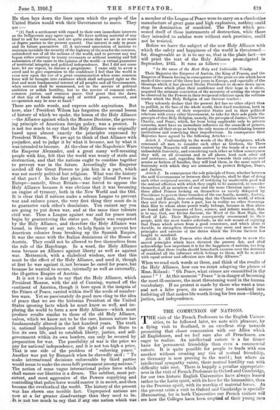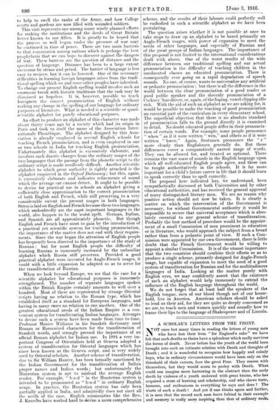THE COMMUNION OF NATIONS. T HE visit of the French Professors
to the English Univer- sities, to be followed later, we note with pleasure, by a flying visit to Scotland, is an excellent step towards promoting that closer communion with our Allies which all Englishmen, and we feel sure also all Frenchmen, are eager to realize. An intellectual entente is a far firmer basis for 'permanent friendship than even a commercial entente. It is quite possible for people to trade with one another without creating any ties of mutual friendship, as Germany is now proving to the world ; but where an intellectual sympathy exists, there mutual hostility can with difficulty take root. There is happily a peculiar appropriate- ness in the visit of French Professors to Oxford and Cambridge, for our two historic English Universities have always leaned rather to the Latin spirit, with its love for the humanities, than to the Prussian spirit, with its worship of material fOrces. At the present crisis a visit to Oxford and Cambridge is specially illuminating, for in both Universities our French visitors will see how the Colleges have been emptied of their young Inca to help to swell the ranks of the Army, and how College courts and gardens are now filled with wounded soldiers. This visit represents one among many wisely planned efforts. for making the institutions and the deeds of 'Great Britain better known to our Allies. It is greatly to be hoped that the process so well begun under the pressure of war may be continued in time of peace. There are two main barriers to that communion among nations which is perhaps the best prophylaXis that we can hope to discover against the dangers of war:' These barriers arc the 'question of distance and the question of language. Distance has been -to a large extent overcome by steam and petrol. The barrier of language is less. easy to remove, but it can be lowered. One of the necessary difficulties in learning foreign languages arises from the tradi- tional spelling which we and some other peoples have inherited. To change our present. English spelling would involve such au enormous break with historic traditions that the task may be dismissed as hopeless. It is; however, possible to teach foreigners the correct pronunciation of English without making any change in the spelling of our language for ordinary purposes of literature. What is needed is a scientific or quasi- scientific alphabet for purely educational purposes.
An effort to produce an alphabet of this character was made about thirty years ago by a society which had its origin in Paris and took to itself the name of the Association Inter- nationale Phonetique. The alphabet designed by this Asso- ciation is already employed in several English schools for teaching French pronunciation, and is even employed in one or two schools in India for teaching English pronunciation. Unfortunately this alphabet is excessively elaborate, and involves such drastic changes from the ordinary usages of the two languages that the passage from the phonetic script to the ordinary script is made needlessly difficult. Another scientific alphabet to which great authority is rightly attached is the alphabet employed in the Oxford Dictionary; but this, again, is excessively elaborate and indicates refinements of sound which the average ear cannot detect.. It ought to be possible to devise for practical use in schools an alphabet giving a sufficiently close approximation to the correct pronunciation of both English and French, while still preserving to a very considerable extent the present usages in both languages. Stress is laid on English and French because these two languages, which undoubtedly are the innst important languages in the world, also happen to be the wotst spelt. German, Italian, and Spanish are all approximately phonetic.. But though English and French have most to gain by the introduction of a practical yet scientific system for teaching pronunciation, the importance of the matter does not end with their require- ments. Since the war began the attention of English people has frequently been directed to the importance of the study of Russian ; but for most English people the difficulty of learning Russian is immensely increased by the unfamiliar alphabet which Russia still preserves. Provided a good _ practical alphabet were invented for Anglo-French usages, it could with a little expansion be adapted so as to serve for the transliteration of Russian.
When we look beyond Europe, we see that the case for a scientific alphabet for educational purposes is imineitely strengthened. The number of separate languages spoken within the British Empire certainly amounts to well over .a hundred. - Most of these are represented by *strange Oriental ' scripts .having no relation to the Roman type, which has established itself as a standard fot European languages, and having in many cases-no relation to one another. One of the greatest educational needs -of the Indian Empire is a con- venient system for transliterating Indian lancruages. Attempts to devise such a system have been made from time to time.
Professor Monier Williams in his Sanskrit dictionary used Roman or Romanized characters for the transliteration of Sanskrit words, and strongly pressed the importance of an official Roman alphabet for Indian use. In 1894 a very im- portant Congress of Orientalists held at Geneva adopted a system of transliteration for -Oriental languages which has since been known as the Geneva script, and is very- widely used by Oriental scholars. Another scheme of transliteration, due to Sir William Hunter, has been formally sanctioned by the Indian Government for the transliteration of Indian proper names and Indian words ; but unfortunately the Hunterian system is apt to mislead the average English reader. For example, “ b-a-d " in the Hunterian system is intended to be pronounced as " b-u-d " in ordinary English usage. In practice, the Hunterian system has only been partially applied in India, and admittedly does not meet all the needs of the case. English missionaries like the Rev. J. Knowfis have worked hard to devise a more comprehensive scheme, and the results of their labours could perfectly well be embodied in such a scientific alphabet as we have been postulating. .- The question arises whether it is not possible at once to take steps to draw up an alphabet to be based primarily on Anglo-French usages, with power of expansion to meet the needs of other languages, and especially of Russian and of the great groups of Indian languages. The importance of this proposal is not limited to the international considerations dealt with above. One of the worst results of the wide difference between our traditional spelling and our actual pronunciation is the difficulty of teaching children in the uneducated classes an educated pronunciation. There is consequently ever going on a rapid degradation of speech sounds. No one, of course, wants to universalize any artificial or pedantic pronunciation ; but there is all the difference in the world between the clear pronunciation of a good reader or good public speaker and the slovenly pronunciation of a Cockney 'bus-driver, or, again, of the lisping, vowel-clipping idle rich. With the aid of such an alphabet as we are asking for, it would be possible to make the teaching of good pronunciation an essential part of the curriculum in every elementary school. The superficial objection that there is no absolute standard of pronunciation falls to the ground directly it is examined in detail. No doubt educated people differ in their pronuncia- tion of certain words. For example, some people pronounce when " as if it were written " wen," and others as if it were written " hwen." Again, Scotsmen pronounce the " r " more clearly than Englishmen generally do. But these differences cover a comparatively narrow range of words. They can be allowed for, and treated as optional. There remains the vast mass of sounds in the English language upon which all well-educated English people agree, and these can be taught authoritatively in the schools. It is far more important for a child's future career in life that it should learn to speak correctly than to spell correctly.
The proposal here indicated has, we understand, been sympathetically discussed at both Universities and by other educational authorities, and has received the general approval of many distinguished literary men. We see no reason why positive action should not now be taken. It is clearly a matter on which the intervention of the Government is necessary, for without Governmental authority it would be impossible to secure that universal acceptance which is abso- lutely essential to any general scheme of transliteration. Probably the best method of procedure would be the appoint- ment of a small. Commission of men prominent in education or in literature, who would approach the subject from.a broad rather than from a pedantic point of view. If such a Com- mission were appointed by our own. Government. there is little doubt that the French Government would be willing to appoint a similar Commission. It is of the utmost importance that the two countries should combine their efforts so as to produce a single scheme, primarily designed for Anglo.Frenoh usage, but capable of expansion to meet the need of a good system of transliteration for Russian and for the multitudinous languages of India. Looking at the matter purely with English eyes, we may confidently assert that the existence of such an alphabet would help immensely to extend the influence of the English language throughout the world. . - We do not forget that at least half the speakers of the English tongue,,men of our blood though not of our house- hold, live in America. American scholars should be asked to lend us their aid, for they are-quite as deeply concerned as we are, to teach men and women quickly and soundly how to frame their lips to the language of Shakespeare and of Lincoln.
•



































 Previous page
Previous page